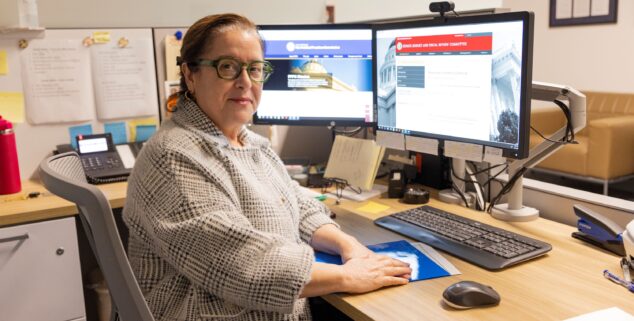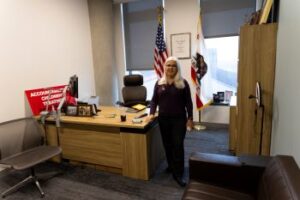News
Schedulers: The California Capitol’s unsung heroes
 Scheduler Anna Esparza. Photo by Ellie Appleby, Capitol Weekly
Scheduler Anna Esparza. Photo by Ellie Appleby, Capitol WeeklyGetting a meeting with a lawmaker at the California State Capitol is often an exercise in patience and flexibility, one that generally has multiple moving parts. And no matter who is doing the asking, the process almost always starts with the same person – the scheduler.
“A scheduler is one of the most important positions in a legislator’s office. Legislators live and die by their calendar, and so being able to make sure that you have someone that is competent and capable of keeping that calendar updated with relevant information is crucial,” says Terry Schanz, chief of staff for Assemblymember Tina McKinnor (D-Inglewood).
A day in the life of a scheduler is often intense, always fast-paced and rarely without its challenges. Most offices expect schedulers to manage mail flow, greet visitors, answer phone calls and order supplies in addition to managing the non-stop inflow of meeting requests that sometimes can reach up to as many as 30 to 40 a day.
Those requests are hardly standard in scope, and run the gamut of options: in person or by Zoom, a speaking request or an appearance at a reception, a training, a briefing or an appearance at any number of other events that could run from a few minutes to as much as an hour or more.
Keepers of the time
As the keeper of that time, it’s no wonder schedulers wish there was more of it. Whether in a seasoned legislator’s office or a brand new member, the requests for that person’s time are never-ending.
So how do they decide who gets what time?
Jenn Short, who has navigated the offices of four different legislators over 15 years, says that’s where their expertise in knowing their legislator’s priorities shines.
“The role of a scheduler—I mean— a good scheduler, is really to look [at] and assess all of the different expectations, all of the things that are coming at you at the same time, and to be able to prioritize them and apply your knowledge of the legislature, [and] the bill package that we have, [as well as] the goals of the majority of the member, and to be able to guide staff and the member when needed on things,” she says.
Which is why experience – and knowing your boss’s specific needs and interests – is so critical.
“Not one request is the same, so knowing where each request fits for Senator Grove is crucial,” says Alicia Zgombic, scheduler for Sen. Shannon Grove (R-Bakersfield).
As the keeper of that time, it’s no wonder schedulers wish there was more of it. Whether in a seasoned legislator’s office or a brand new member, the requests for that person’s time are never-ending.
Schanz notes that a scheduler has to also take their member’s travel time into consideration.
“A member is able to have 15 minute back-to-back meetings in Sacramento because people can come to the office. But if that member is down in Los Angeles County, you may have meetings in different parts of the county throughout the day that can take the member longer to get from one meeting to the next. A good scheduler knows that you cannot schedule back-to-back meetings if they’re in another part of town.”
Some members fly or drive up and down from Sacramento to other parts of the state every week and need someone to support their travel affairs along with making sure that they get to session on time. It’s also knowing both daytime and evening schedules, and even finding personal time for the member to keep up with family affairs.
“It’s about knowing how to spin a bunch of plates all day long,” says Schanz.
Sometimes those plates can come crashing down when something like a natural disaster occurs, which then takes precedence over other already scheduled meetings. A scheduler has to act quickly to cancel and rebook previous appointments.
“It very much feels like a table full of puzzle pieces that keep getting knocked over. You can’t cry over it, you can’t go out and buy a new puzzle, you just have to pick up the pieces and keep on putting it together, continually working on it day after day,” says scheduler Anna Esparza, who keeps tight tabs on Senator Scott Wiener’s (D-San Francisco) schedule.
Esparza says her job can look like a secretary’s job to many, but it really is not that at all. “The one way to describe my job is that it’s a critical, high level executive assistant that also has to be a support person to their member.”
The art of organization
Being a scheduler is both a skill set and an art form steeped in organization.
“I know that our job seems so unglamorous to people, but I have come to realize in this world that there’s so many people that are sort of working quietly behind the scenes that allow our representatives, and any others at a higher level, to really be able to successfully do their job,” says Short, who currently schedules for the California Legislative Women’s Caucus and Assembly Majority Leader Cecilia Aguiar-Curry (D-Winters).

Scheduler Jenn Short with AML Cecilia Aguiar-Curry. Photo by Ellie Appleby, Capitol Weekly
That behind-the-scenes work is what keeps everything running smoothly, and good schedulers usually thrive in the ever-evolving Capitol environment that might send others running. And once they find their groove, the constant juggling of shifting priorities becomes second nature.
For scheduler Erin Dacumos-Khanna, who works for Assemblymember Jose Luis Solache Jr. (D-Lakewood), scheduling runs in the family; her mom retired as one, and her sister currently schedules for Assemblymember Joaquin Arambula (D-Fresno). She’s been in the role herself since 2013, managing the constant changes and lack of time. A nameplate on her desk, a gift from a former colleague, reads “Rescheduler”— a joke most who have held the role will understand.
While Dacumos-Khanna can laugh about the time spent rescheduling, it’s the ability to seamlessly adapt to any situation at any moment that makes the scheduler’s role so vital in the effectiveness of their legislator’s office.
“We just try to make the member’s life easier, help them flow and we do our best to try to accommodate as many people as we can,” Dacumos-Khanna says. “There’s never enough time.”
It’s a relationship business
While schedulers will tell you that their most important role is their calendar, the second most important role is having a good relationship with their member.
Scheduler Darien Davis, who works for McKinnor, believes that being in good communication with his boss is crucial.

Scheduler Darien Davis, Photo by Ellie Appleby, Capitol Weekly
“Having that interpersonal connection with your member, will allow you to understand their schedule and how they work, so you can work along with them exactly on what is on their priority level,” he says.
Grove’s scheduler Zgombic agrees.
“It’s a challenge to make sure that you can keep the member on schedule and where they need to be at all times, and that can be eight hours of keeping them on track, or even as long as 10 hours in one day, so having a good relationship is key,” she says.
For most, the relationships they build and the people they meet along the way are what make the work meaningful.
Bailey Walda, a 2021 Chico State graduate with a bachelor of science in exercise physiology, has found her footing in politics over the last three years in the office of Assemblymember Buffy Wicks (D-Oakland). Walda lists three key aspects of her job: staying organized, anticipating her legislator’s needs and tracking her whereabouts.
In an office as busy hers – Wicks is the chair of the Assembly Committee on Appropriations – it’s no wonder Walda jokes she wishes she could attach an AirTag to her boss. Despite the challenges, the relationships with her team keep her coming back.
“Our whole office, our personal staff and the committee staff, they’re all just so great, so helpful, especially for someone like me coming in new to the building, not having a background in any of this,” Walda says. “Their generosity and kindness and willingness to answer any question that I have has just always makes me happy to come to work in the morning.”
For schedulers like Short, the bond formed through not just organizing a legislator’s schedule but truly getting to know them can be lasting. She feels lucky to have built that closeness and camaraderie with her legislators, reflecting fondly on the emotional experience of packing up two offices when they termed out.
“I have packed up two members after they’ve termed out, and that is also a really special time. You get pretty close with your member, and feeling like you really care for them has made such a difference for me in doing this work,” Short says.
Schedulers keep the trains running on time, ensuring their legislator can work as seamlessly as possible. No matter what comes their way, their ability to keep things moving with grace and skill can go unnoticed but never underappreciated.
“I think just getting the acknowledgement from other staff, like when they say, ‘thank you so much for doing this,’ that is the rewarding part,” Walda says. “I’m helping these people get their job done, [and] that always makes me feel really good.”
The evolution of technology
Zgombic has worked 30 of her 40 years at the Capitol as a scheduler, and has witnessed firsthand the evolution from typewriters and scheduling books to everything being done on computers.

Scheduler Alicia Zgombic. Photo by Ellie Appleby, Capitol Weekly
“Back in the day, erasers were a must when you had a scheduling book,” Zgombic says. She remembers the importance of index cards and how she would take one and roll it into the typewriter to type out the appointments.
“I would type the whole day’s schedule on the index card because the member could just stick the card in their pocket and pull it out and look at it when they needed to go to the next meeting,” she says.
Google or Outlook calendars on the computer have now since replaced those days.
“It is a challenge to make sure that they keep their member on schedule and where they need to be at all times, so being able to have everything digital where everyone can see on their computer or phones where the member needs to be, makes it easier for coordinating the members time,” Schanz says.
Davis feels a good scheduler also must be solution-oriented. “I feel like the job that many people may look at as stressful, I look at it as an opportunity,” he says.
Davis’s mother, who is retired, once worked in the same political space that Davis now works in. Davis says his mother taught him the most important features of the job are to be respectful, presentable and the ability to quickly find fast solutions when problem arise.
“If anything comes my way, I feel like taking a deep breath and handling it, rather than look at it as another thing on my plate,” he says.
Schanz’s hope is that through the constant pressure of a fast-paced job schedulers recognize their value, that staff and members truly value them as important parts of the team and of the work that they do.
“Without their work,” he says, “the representatives couldn’t do the work for their constituents.”
Ellie Appleby & Leah Lentz are Capitol Weekly interns. Both are editors with The Express, the Sacramento City College student newspaper.
Want to see more stories like this? Sign up for The Roundup, the free daily newsletter about California politics from the editors of Capitol Weekly. Stay up to date on the news you need to know.
Sign up below, then look for a confirmation email in your inbox.

Leave a Reply